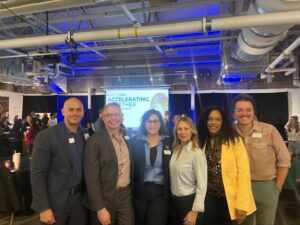Premier Members Credit Union (PMCU) is the first credit union in Colorado to be certified by the Colorado Green Business Network (CGBN). This certification recognizes PMCU’s greenhouse gas emission reductions, support of environmental sustainability and environmental justice organizations across the front range and their equitable business practices both internally and externally.
“Since 2019, our sustainability program has overseen a 17% decrease in the greenhouse gas intensity of PMCU buildings and increased purchase of renewable energy credits to over 20% of our total electricity consumption,” said Garrett Chappell, Senior Sustainability Specialist at PMCU. “We have also to re-invested over $40,000 to local grassroots organizations across all our member communities fighting to preserve Colorado’s environment and the well-being of our families and neighbors.”
We spoke with Garrett to learn more about the CGBN Certification and PMCU’s sustainability initiatives.

What does your role look like at PMCU?
It is a privilege that sustainability is my full-time job and a testament to the priorities of our organization. As the only full-time person in sustainability, I work for and with every department. My work is very borderless. My biggest allies throughout the organization have been those in facilities, HR and accounting. These connections were vital throughout the CGBN Certification process when we needed to submit historical data related to pay and company travel.
Education is a big part of what I do. I get to go into communities where we have branches and work with our teams to think about the triple bottom line approach to programming. I also have a role in building familiarity with sustainability issues with those working in facilities and city organizations.
What motivated PMCU to pursue the CGBN Certification?
PMCU has branches throughout The Front Range, and since 2020, some of our Boulder Metro branches have applied to their municipality’s sustainable business programs. Building off of that success, the state program was a fitting next step as it’s the highest-level certification that’s available for free and open to businesses of any size. As a credit union, our business model is people helping people, so sustainability and equity-based work is a natural next step for us.
The CGBN criteria covered internal policy and resource use in the areas of energy, water, transportation, purchasing and waste. It also includes points for reduction in total use. Learn more about the CGBN Certification program.
Tell us more about the sustainability initiatives at PMCU.
Because of the square footage of our branches, our individual building emissions are very low, but there are still steps we take to reduce our carbon footprint. One initiative that made a significant difference in our greenhouse gas emission reduction was moving employees from individual branches to a centralized headquarters, which is a newer and more efficient building. In several buildings we’ve switched to LED lights and taken measures to reduce water use with irrigation sensors and low-flow aerators on the sinks.
In the future we’re looking to replace eligible HVAC systems with more efficient models and heat pumps, and we’re planning to transition landscaping to pollinator friendly plants that are more attuned to our high desert environment.
What advice do you have for others who are interested in reducing their organization’s environmental footprint?
It’s okay to start slow and make progress where you can. A good place to start would be establishing a utility usage baseline and looking at where you can begin to reduce. Resources like the Energy Star Portfolio Manager are helpful at this stage. Partnering with municipalities is also very helpful. Many have sustainability programs or the resources to do waste and water audits, typically for free. While sustainability may not be your full-time job, hopefully you have the capacity to at least open the door to the experts.
It’s also helpful to begin the conversation with your teams in terms of how much money conservation efforts can save your organization. This is a way to translate sustainability for the people who don’t think about it or may not have the energy during the day to focus on sustainability.
